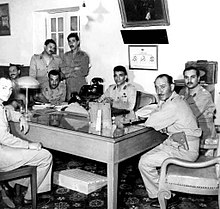
Back حركة الضباط الأحرار Arabic الظباط الاحرار ARZ Azad zabitlər hərəkatı (Misir) Azerbaijani Движение на свободните офицери (Египет) Bulgarian Moviment d'Oficials Lliures Catalan Bewegung der Freien Offiziere (Ägypten) German Movimiento de Oficiales Libres Spanish خیزش افسران آزاد (مصر) Persian Vapaat upseerit Finnish Mouvement des officiers libres French
| Free Officers Movement (Egypt) | |
|---|---|
| حركة الضباط الأحرار | |
 The flag of the Egyptian Revolution and Egypt (1953–1958) | |
| Active | 1949–1953 |
| Countries | |
| Engagements | 1948 Arab–Israeli War 1952 Egyptian Revolution |
| Commanders | |
| Commanders | Mohamed Naguib Gamal Abdel Nasser Abdel Hakim Amer Abdel Latif Boghdadi Zakaria Mohieddin |
| Part of a series on |
| Egyptian Armed Forces |
|---|
| Administration |
| Service branches |
| Armies and Military Areas |
| Special Forces |
| Ranks of the Egyptian Military |
| History of the Egyptian military |

The Free Officers (Arabic: حركة الضباط الأحرار, romanized: Ḥarakat al-dubbāṭ al-ʾaḥrār) were a group of revolutionary Egyptian nationalist officers in the Egyptian Armed Forces and Sudanese Armed Forces that instigated the Egyptian revolution of 1952. Initially started as a small rebellion military cell under Abdel Moneim Abdel Raouf, which included Gamal Abdel Nasser, Hussein Hamouda, Khaled Mohieddin, Kamal el-Din Hussein, Salah Nasr, Abdel Hakim Amer, and Saad Tawfik, it operated as a clandestine movement of junior officers who were veterans of the Palestine War of 1948–1949 as well as earlier nationalist uprisings in Egypt in the 1940s.[1][2]
The nationally respected Arab-Israeli War veteran Mohamed Naguib joined the Free Officers in 1949. Naguib's hero status, and influence within the army, granted the movement credibility, both within the military and the public at large. He became the official leader of the Free Officers during the turmoil leading up the revolution that toppled King Farouk in 1952. The Movement was succeeded by the Revolutionary Command Council after the overthrow of Farouk that was later succeeded by the Supreme Council of the Armed Forces.[3]
- ^ Hussein Mohamed Ahmed Hamouda, Asrār Ḥarakat aḍ-Ḍubbāṭ al-ʾAḥrār wa l-Ikhwān al-Muslimūn, al-Zahrā' al-i'lām al-'arabī (1994), Chapter 6, section 4: see http://www.goodreads.com/book/show/9434122
- ^ Abou-El-Fadl, Reem, ed. (2018), "The Free Officers in Opposition: Imagining Revolution", Foreign Policy as Nation Making: Turkey and Egypt in the Cold War, The Global Middle East, Cambridge: Cambridge University Press, pp. 101–122, doi:10.1017/9781108566025.004, ISBN 978-1-108-47504-4, retrieved 2023-08-29
- ^ Stenner, David (2019). Globalizing Morocco. Stanford University Press. p. 72.